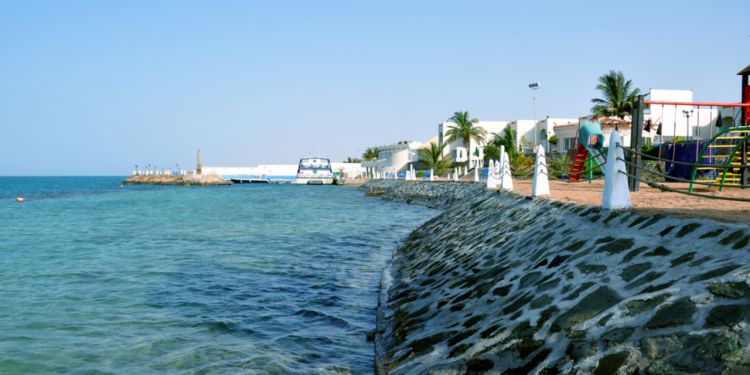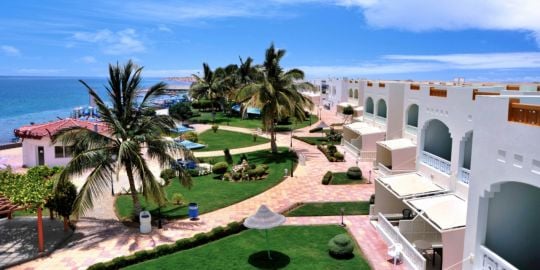Finding a job in Yanbu

Yanbu, which is found near the Red Sea, is deemed to be a port and industrial city. It is, in fact, the country's second port after Jeddah. Situated on the ancient incense and spices route from Yemen and Egypt and the Mediterranean region, Yanbu's port today enables 3 million barrels/day export of crude oil, thanks to the proximity with the Suez Canal. That eases access to the European, African and Middle Eastern markets.
An important petroleum shipping terminal, nowadays Yanbu is developing its tourism potential and economy. Located between the Red Sea coastal line, rich in corals and the Hijaz mountains, the city is an attractive diving destination. Yanbu also has an airport, operating both domestic and international flights.
To date, its population amounts to some 200,000 inhabitants, including many foreigners who have settled there for professional reasons. Among them, you will find Asians, Europeans, Americans, Canadians, as well as other Middle-East nationals having been recruited mainly in the oil refining and petrochemical fields.
The city can boast of its contribution to Saudi Arabia's industrialization thanks to the presence of many factories and industries, which are found over some 24 km of coastline and 7 km inland.
Economy of Yanbu
Some 185 km² in Yanbu is reserved for industrial use. In fact, it is home to some 32 hydrocarbon, petrochemical and mineral industries, as well as some 51 small and medium enterprises. Currently, some 14 primary and secondary plants are being planned and set up across this zone.
Note that Yanbu is an accomplished city as it supports many facilities, including flood control channels, an electrical energy production factory, a desalination plant that serves not only industries but households also, as well as a seawater pumping station which is used for cooling industrial infrastructure as well as the treatment of industrial waste and wastewater. Other developed areas are the following: the road network, the King Fahd industrial port, the telecommunications network, cable television, telex, etc.
Furthermore, primary industries in Yanbu produce the raw materials needed by secondary industries. These include methane, carbon dioxide, diesel, ethylene, glycol xylene, oxygen, etc. As regards secondary industries, these are dominated by the mining and petrochemical fields. Other fields such as solar technology, painting and metallurgy have also been developing over the years. The manufacturing industry, which initially relied on the production of building materials such as concrete, recently opened its doors to other related industries, as well as to food, chemicals, steel and cooking oil production.
Finally, the King Fahd port, which is known to be the Red Sea's biggest port, specializes in the transport of crude oil, refined products and petrochemicals. This port's infrastructure is similar to an industrial complex to meet the needs of liquid and solid products export towards international markets. It also facilitates the import of equipment and mechanical components.
Good to know:
Foreigners who specialize in the construction field may be luckier during their job search in Yanbu. In fact, many projects are currently ongoing in the city, such as a sea excavation project, marine drainage on the waterfront, and many others. Road infrastructure development, drinking water and electrical systems, recreational sites, parks, etc., should follow shortly. These are expected to create thousands of jobs.
Job hunting in Yanbu
If you have not been transferred to Yanbu by your company, you can still try to find a job there by various means. Note, however, that if you want to work in Saudi Arabia, you will need to secure a job offer prior to coming to the country. To work in Saudi Arabia legally, you will need to apply for a residence permit known as Iqama — and the only way to do this is by having an employer in Saudi Arabia sponsor your application.
You can start your job hunt in Saudi Arabia by checking some of the most popular job search websites in the region, like Bayt and Naukrigulf. International career websites are also a good place to start — check out MonsterGulf, Glassdoor, Indeed and others.
If you have a company in mind in Saudi Arabia that you would like to work for, you can also send out your application directly to the hiring manager of said company. Checking local forums and expat groups like Yanbu Expatriates can also be very helpful in your job search.
Important:
When applying for a job in Saudi Arabia, keep in mind that Saudi Arabia employers are typically looking for very specific expertise when hiring expatriates. In addition, due to new Saudisation policies, companies now have to justify employing an expatriate as opposed to a Saudi Arabia citizen. This is why it is important that you highlight the specific skill set required for the position you are applying for — both in your CV and cover letter.
Here are a few guidelines for your application:
- In most cases, you can send out a standard Western-style CV — unless specific requirements for the application were mentioned in the job offer. You can use a chronological CV format (where you list your work experience in reverse order: starting from the latest position); a skill-based format (where you center your CV around the skills and expertise that you want to highlight), or a mixed format (where you combine the elements from both CV formats described above).
- Sending your application only in English is acceptable for most positions. However, if the job you are applying for demands a certain level of Arabic, it makes perfect sense to add copies of your CV and cover letter in Arabic.
- As we've mentioned, it's important that you highlight relevant skills and expertise in your CV and cover letter to make your application stand out and provide a reason for your potential employer to hire you over a local citizen. Make sure to do proper research of the company you are applying for. Look over the job ad one more time and customize your CV so that it matches (as much as possible) what the company is looking for.
- When compiling your CV, it is also important to be well aware of the local sensitivities and restrictions. For instance, it's highly recommended not to make any references to countries like Israel and Iran. It's also best to avoid any mention of religious organizations and groups.
How to apply for a working visa to Saudi Arabia
In order to be in long-term employment in Saudi Arabia legally, you will need to apply for a residence permit called Iqama. The Iqama is a national residency permit for foreigners living and working in Saudi Arabia that “explains” their presence in the country.
An Iqama looks like an ID card and includes the following information:
- Your legal name and nationality
- Your date of birth
- The Iqama number
- Your job title and the name of your employer
- The validity period, issuance date and expiry date of your Iqama card
Important:
You must carry your Iqama card with you at all times. If you are stopped by police in Saudi Arabia and don't have your Iqama card with you, you could be facing a fine of upwards of SAR 1,000 and even a jail term of up to six months.
If you have lost your Iqama card or if it has been stolen, you need to immediately report it missing. If you haven't reported that your card has been lost in time, you could also be fined in the amount of up to SAR 3,000. Overstaying in the country on an expired Iqama can result in deportation.
To apply for an Iqama, you need to be sponsored by an employer in Saudi Arabia. It is your employer who will need to apply for a sponsor permit at the Ministry of Labour and Social Development and then for a Visa Authorization number. Next, when you arrive in Saudi Arabia, your employer will have 90 days to apply for an Iqama visa for you. Once you receive it, you will be able to apply to an Iqama for your family members. The Iqamas issued to your spouse and children are not tied to your employer like yours, but instead, they are attached to you.
Important:
The only way to be legally employed in Saudi Arabia is by applying for and receiving a work visa. If you try to work in Saudi Arabia illegally and get caught, the penalties can be quite severe. You may have to pay a fine of up to SAR 10,000 and are also likely to be arrested and deported.
Special privilege Iqama
Some expats will be able to apply for what is called the Special privilege Iqama. This residence permit is reserved for highly qualified foreigners and lets its holders enjoy a number of benefits like owning real estate, renting out properties and more. A Special Privilege Iqama Center has been created to regulate everything related to the new Iqama.
Good to know:
If you are interested in working in Saudi Arabia for a shorter term, you can apply for a business visit visa or a work visit visa.
A business visa will let you operate business transactions with a Saudi company. A work visit visa allows employees from a foreign company to work in Saudi Arabia for a period of 30 to 90 days.
Working hours in Saudi Arabia
A typical working day in Saudi Arabia lasts from Sunday to Thursday from 8 am to 6 pm or from 7 am to 7 pm with a longer lunch break.
Friday and Saturday are official off days. The working week can last for a maximum of 48 hours, and during the holy month of Ramadan, this time is shortened to 30 hours per week.
Employees typically get 21 days of paid leave. After you've completed five years of employment, your paid leave goes up to 30 days.
There are also three main public holidays in Saudi Arabia. The number of days off you receive during each holiday depends on whether you work in the public or private sector:
- Eid Al Fitr (three to seven days)
- Eid Al Adha (three to seven days)
- Saudi National Day (23 September)
Workers' rights in Saudi Arabia
Unfortunately, violations of foreign workers' rights are not uncommon in the country — especially when it comes to those involved in manual labour. A common practice that is still in force in some companies in Saudi Arabia is the confiscation of passports of foreign employees on their arrival in the country. Basically, when employed in such a company, foreign workers will need to ask their employer for permission when they want to leave the country.
Another problem is the absence of trade or labor unions in the country. The absence of proper representation makes solving work-related disputes and protecting workers' rights more complicated.
Women in the workplace in Saudi Arabia
Today, women can legally work in Saudi Arabia — even alongside men. However, until quite recently, this wasn't the case at all, and the role of women in the country's economy was very limited. However, one of the key incentives of Saudi Vision 2030 was to encourage women to play a bigger role in the workplace. As a result, in 2020, one in four employees in Saudi Arabia were women. This number is expected to receive a 30% boost by 2030. Unfortunately, this positive trend is offset by a substantial gender pay gap: on average, women in Saudi Arabia earn over 50% less compared to their male colleagues.
Useful links:









